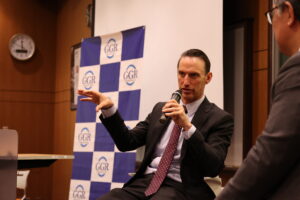On June 3, 2024, the Center for Global Online Education and the Institute for Global Governance Research (GGR) at Hitotsubashi University co-hosted a lecture by Mr. Charles Oppenheimer, grandson of Dr. Robert Oppenheimer and the founder of the Oppenheimer Project, titled “Advancing the Peaceful Use of Nuclear Energy to Promote Global Prosperity.” The session was moderated by Professor Nobumasa Akiyama of Hitotsubashi University.
The session began with an introduction by Mr. Charles Oppenheimer, who discussed the motivations behind founding the Oppenheimer Project. He emphasized his ambition to address the threat of nuclear weapons and to promote his grandfather’s values of achieving peaceful cooperation on nuclear issues. He also expressed his inspiration to combat climate change through the safe use of nuclear energy. The moderator started the discussion with a question on whether we can ensure that nuclear technology is used peacefully and not for harmful purposes. The speaker noted that historically, nuclear issues have centered on weapons, but in the 21st century, the focus must shift to addressing climate change through the peaceful use of nuclear energy. Then, the discussion continued on whether it is possible to control nuclear proliferation amidst the increasing arms race among the U.S., Russia, and China. Mr. Oppenheimer responded that reducing tensions and fostering collective cooperation among these powers is essential to address the common threat of climate change. He emphasized the importance of dialogue and communication platforms among great powers to build a consensus and a sense of urgency.
The discussion then touched upon the issue of budget allocations among domestic actors and the U.S. commitment to nuclear issues. Mr. Oppenheimer highlighted the robust U.S.-Japan alliance after the devastating war as an example of how mutual understanding and peace can be achieved, potentially attracting other parties to join similar efforts. The conversation also explored the future of nuclear fusion technology. While acknowledging its potential, Mr. Oppenheimer stressed the importance of not overlooking practical nuclear fission technology, which currently faces budget constraints. Both the speaker and the moderator also discussed the role of media in spreading misinformation about nuclear technology, often misinterpreted as deadly, which affects investment decisions.
Finally, addressing Japan’s history with nuclear incidents in Hiroshima, Nagasaki, and Fukushima that have caused panic among the domestic audience, Mr. Oppenheimer encouraged the Japanese people, particularly the younger generation, to rely on scientific facts. The lecture concluded with a Q&A session where Oppenheimer addressed various topics, including the prospects of AI in nuclear technology, carbon industry management, the potential for Japan and Taiwan to pursue nuclear deterrence against China, the intersection of science and politics, the fairness of nuclear plant locations, and the human rights issues faced by workers exposed to radiation.
【Event report prepared by】
Prakrit Rakwong (Doctoral student, Graduate School of Law, Hitotsubashi University)



